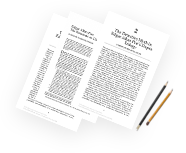Answer each of the following 5 questions in an essay of two pages (10 pp. total). A premium will be placed on precision in the writing and concise thinking. Remember: Writing Counts! So take advantage of the opportunity to revise as the semester progresses. We will be looking for evidence that you have attended lecture and done the mandatory readings.
1. The authority to determine what a text “means” has traditionally been vested in the author. However, modern theory has argued in some instances that the language of the text is the ultimate authority and in other instances, that it is the reader. Summarize and evaluate the arguments for each of these three positions. (Schliermacher, Barthes, Brooks, Foucault, Fish, Iser?)
2. The nature of history– is it a grand narrative, a series of explanatory mini-narratives, just stuff that happens?— is a preoccupation of modern theory. Does history even exist apart from our writing about it? Summarize and evaluate the major theories of history covered in the readings. (Hegel, Marx, Nietzsche, White, Lyotard?)
3. In the 19th Century, language was viewed as an historical phenomenon, inseparable from the culture in which it is embedded and which it expresses. This holistic approach to language was called Philology. Early in the 20th Century, theorists began to discuss language as an ahistorical system that provides the common basis for all historical languages. The question of the nature of language was of perpetual interest to theorists throughout the 20th Century and remains so today. Discuss the major approaches to language presented in the book, including the structural, rhetorical, and deconstructionist. (Saussure, Jakobson, DeMan, Derrida?)
#nature #history #grand #narrative #series




